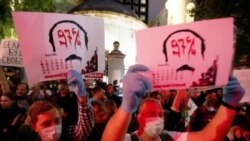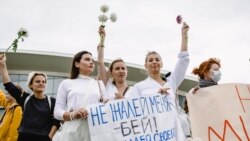On Aug. 9, preliminary results gave Belarus President Aleksandr Lukashenko a landslide reelection victory against his main political opponent, Svetlana Tikhanovskaya – who is married to Sergey Tikhanovskiy, a former candidate who’s jailed since May.
Many Belarusians and foreign leaders are disputing the results, but not Venezuelan President Nicolas Maduro. It was a favor returned: Lukashenko had congratulated Maduro after a similarly rigged vote in 2018 that triggered a leadership crisis persisting today.
Maduro put out a statement praising Lukashenko for his “undeniable victory.”
The outcome, it said, was “a clear triumph that expresses the loyalty of the Belarusian people to their national sovereignty to guarantee their integral development, prosperity, and maintenance of peace and security.”
Maduro’s comments are misleading.
In fact, furious protests began immediately after the polls closed. Lukashenko’s chief opponent – whose husband, a former candidate, is jailed – fled the country. Media reports said thousands of protesters have been arrested since Sunday, and the internet was taken down for hours at a time.
According to election officials, Lukashenko, who has been in power since 1994, received 80 percent of the votes versus 10 percent for Tikhanovskaya, who the opposition says won.
According to CNN, observers reported widespread ballot stuffing. “I believe my own eyes, the majority was for us,” Tikhanovskaya said. "We do not recognize the election results. We have seen real protocols. We urge those who believe that their voice was stolen not to remain silent.”
Russian sociologist Grigory Yudin wrote on Facebook that counting was unreliable on both sides – the government for non-transparency and the opposition for unclear methodology. Still, he estimated based on available data that Tikhanovskaya won with about 70 percent of the vote.
International leaders from Germany, the U.S. and the European Commission expressed concerns, with the commission stating the elections were “neither free nor fair” and that “credible reports of domestic observers show that the electoral process did not meet” international standards.
U.S. Secretary of State Mike Pompeo cited “severe restrictions on ballot access for candidates, prohibition of local independent observers at polling stations, intimidation tactics employed against opposition candidates, and the detentions of peaceful protesters and journalists.”
During three days of protests, 7,000 people were detained by police, 250 were injured and one was killed. Minsk journalist Franak Viačorka tweeted that reporters were being targeted while covering the events. AP News reported that 30 journalists were detained, three of whom were sentenced to administrative arrest (10 to 15 days).
On Wednesday, Viačorka tweeted that "there are multiple pieces of evidence that police have used lethal weapons yesterday in Belarus," and that the official number of 250 injured may be "significantly underestimated."
Belarus authorities cut off the internet amid the protests and stopped protesters from posting on social media. Lukashenko later claimed the internet outages were caused by a foreign adversary, not his government.
In 2018, Lukashenko played the same congratulations card after Venezuela’s disputed presidential election.
He publicly congratulated Maduro for winning, saying that “the election outcome testifies to the broad public support for the ideas of the Bolivarian Revolution and construction of socialism of the 21st century that you, dear Nicolas, have been fearlessly defending amidst difficult political situation abroad and economic counteraction of numerous aggressive forces.”
Venezuela’s election was marred by controversies and called a “farce” by the opposition. Voter turnout was historically low: 46 percent, compared to 79 percent in the three previous elections (2006, 2012 and 2013), as Eugenio Martínez, an expert journalist in electoral processes, told BBC.
Moreover, several organizations and opposition figures expressed concerns over irregularities of the electoral process – such as barring the participation of popular opposition candidates and shortening the voter registration period – all of which led the European Union, the Organization of American States (OAS) as well as countries like the U.S. and Australia to reject the electoral process.
Maduro’s win marked the beginning of the country’s continuing presidential crisis. In January 2019, Juan Guaidó, as leader of the opposition-led National Assembly, declared himself Venezuela’s legitimate president and quickly received support from over 50 countries, including the United States.
Strategic relations between Venezuela and Belarus had increased under the leadership of Hugo Chavez, Maduro’s mentor and predecessor – resulting in joint enterprises such as Petrolera BeloVenezolana, established in 2007. Under the current government, they continue to expand.
In 2017, both nations started working on a road map for cooperation (first introduced in 2013), which could “contribute to the expansion of bilateral cooperation, the development of the industrial sector of Venezuela, building up export capacity, improvement of the financial system, food security, development of agriculture, construction and other sectors of the country,” Belarus' Deputy Prime Minister Vladimir Semashko said.
Whether Belarus might follow Venezuela’s path is anyone’s guess.
On Tuesday, it was reported that Tikhanovskaya left for Lithuania with her children. According to CNN, she posted a video on her husband’s YouTube channel describing her choice to leave.
"I made a very hard decision, I've made this decision on my own ... and I know that many people will understand me, many will judge me and many will hate me, but God forbid you will ever have to face the choice that I had to face,” she said.
Shortly after the video was published, however, a pro-government channel on Telegram shared a video of Tikhanovskaya reading from a piece of paper and asking Belarusians to stop protests – insisting that “the nation has made its choice.”
The video spurred speculation that Tikhanovskaya had been threatened. Her husband, a popular opposition YouTuber, was arrested and prevented from running for president in May – and remains in jail.
Maduro joined other autocratic world leaders who sent congratulations to Lukashenko, including Xi Jinping, Vladimir Putin and Recep Tayyip Erdogan.








![VENEZUELA – Protest in Caracas against elections in Venezuela, March 17, 2018. [Photo: Alvaro Algarra, VOA]](https://gdb.voanews.com/C8C10C1A-9C52-4E05-B262-B002F22C99A7_w250_r1.jpg)